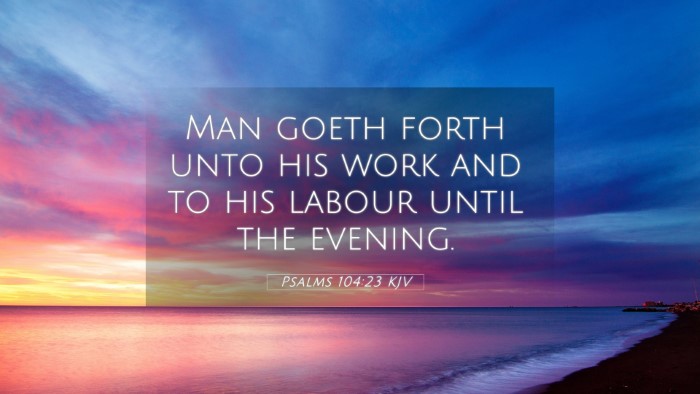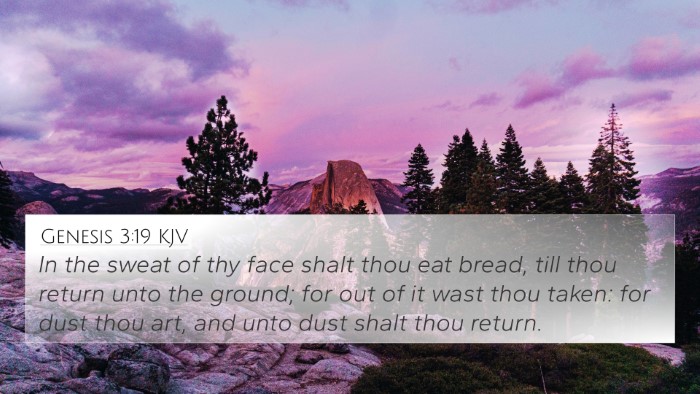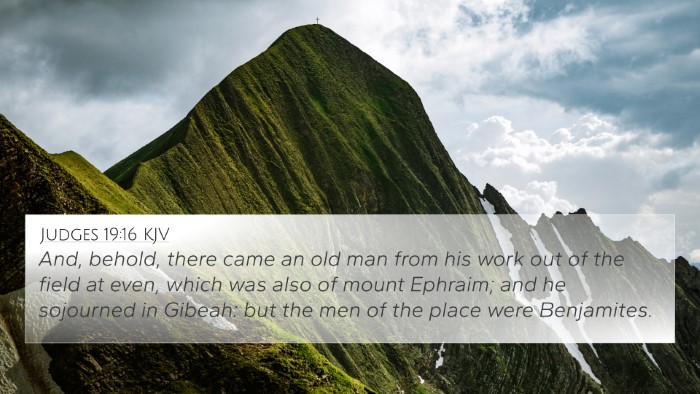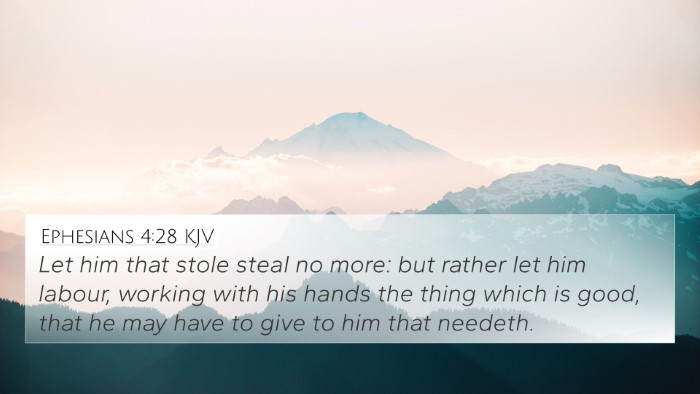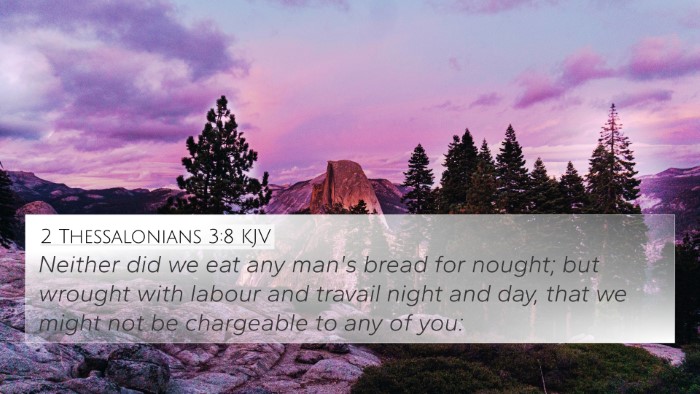Understanding Psalms 104:23
Psalms 104:23 states:
“Man goes forth to his work and to his labor until the evening.”
Summary of Meaning
This verse reflects the daily rhythm of human life, emphasizing the normalcy of work and labor. It encapsulates a divine order where humanity is engaged in purposeful endeavors throughout the day.
Insights from Public Domain Commentaries
Matthew Henry's Commentary
Henry elaborates that this psalm emphasizes the established order of creation where each aspect of life has its designated time. The phrase "Man goes forth to his work" indicates that work is an integral part of human existence. It is a reflection of both labor's necessity and a divine calling to be industrious.
Albert Barnes' Notes
Barnes underscores the idea that labor is a fundamental part of human life. He points out that this verse affirms not only the necessity of work but also the satisfaction and fulfillment that can come from it. The imagery of moving from day to night signifies the completion of tasks and the cycle of life.
Adam Clarke's Commentary
Clarke interprets this verse as a declaration of the divine provision for mankind’s daily needs through work. He posits that the verse represents the ordinary but essential structure that God has ordained in life. The stress on “labor until the evening” suggests a continuous effort until the day is done, trying to accomplish as much as possible in the time given.
Connection to Other Bible Verses
Psalms 104:23 relates closely to various scriptural themes surrounding work, diligence, and the daily routines expected of humanity. Below are some significant cross-references:
- Genesis 2:15 - God's command for man to work and keep the garden establishes the principle of labor.
- Proverbs 14:23 - “In all labor there is profit,” affirming the value of hard work.
- Ecclesiastes 3:13 - “Everyone should eat and drink and take pleasure in all his toil,” highlighting the joy found in work.
- Colossians 3:23 - “Whatever you do, work heartily, as for the Lord and not for men,” connecting earthly work with divine purpose.
- 2 Thessalonians 3:10 - “If anyone is not willing to work, let him not eat,” emphasizing the necessity of work for sustenance.
- 1 Timothy 5:8 - stressing the importance of providing for one's own family as a responsibility.
- Matthew 25:14-30 - The parable of the talents emphasizes using one's abilities and resources diligently.
- James 2:26 - “For as the body without the spirit is dead, so faith without works is dead also,” showing the integral relationship between faith and action.
- Psalm 90:17 - A prayer for God’s blessing on the work of our hands, linking divine favor with labor.
- Philippians 2:14-15 - “Do all things without grumbling or disputing,” demonstrating the attitude we should have in our work.
Thematic Connections
The themes in Psalms 104:23 resonate throughout the Bible, offering insights into God’s expectations for mankind in regard to work. Here are some thematic connections:
- Divine Provision - Work is a means through which God provides for His creation.
- Purposeful Living - Each day is an opportunity to fulfill one's purpose through labor.
- Community Support - The emphasis on labor not only supports the individual but helps in building community.
- Sabbath and Rest - The six days of labor and the seventh for rest underscore the rhythm of work and rejuvenation.
- Faith and Action - Engaging in work reflects our faith in God’s provision and plan for our lives.
Cross-Referencing Biblical Texts
Cross-referencing can reveal deeper understandings and connections between various Biblical texts. Here are some tools and methods for doing so:
- Bible Concordance - A valuable resource for identifying key terms and their occurrences in scripture.
- Bible Cross-Reference Guide - Systems that provide suggested verses related to specific topics or keywords.
- Bible Chain References - Connecting verses thematically to explore Biblical dialogue on specific issues.
- Dictionaries and Lexicons - Helps in understanding original language terms and their implications.
- Study Bibles - Many modern study Bibles include cross-references and notes to assist in exploration.
Methods for Comparative Bible Verse Analysis
Understanding the interrelation of scripture can be enhanced by several comparative analysis methods:
- Identifying Context - Examine the context of each verse to glean how they relate thematically and contextually.
- Topical Studies - Grouping verses by themes can illuminate contrasting and complementary teachings.
- Inter-Biblical Dialogue - Assessing how verses in the Old Testament and New Testament engage can provide insights into consistent messages of faith.
- Devotional Reflections - Reflecting on how verses impact personal faith and everyday living encourages deeper understanding.
Conclusion
In summary, Psalms 104:23 serves as a profound reminder of the importance of work in the life of believers. By engaging with this scripture through cross-references and reflective study methods, one can enrich their understanding of the divine purpose behind human labor. Engaging with other related verses provides a broader context that strengthens faith and promotes a diligent lifestyle aligned with God’s intentions.

